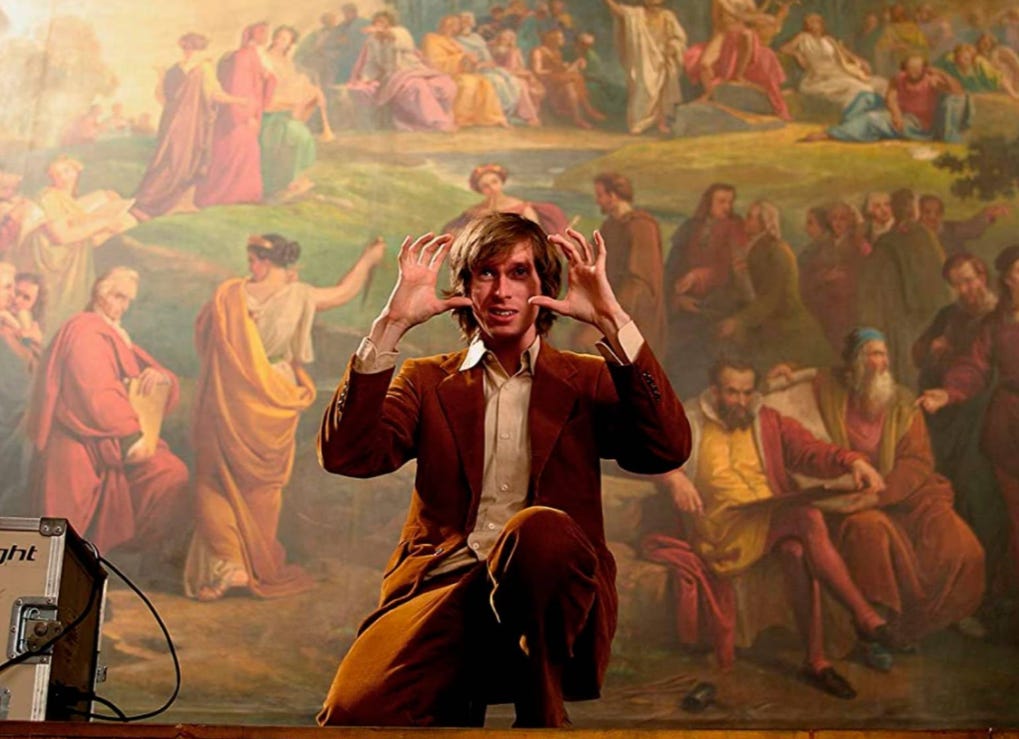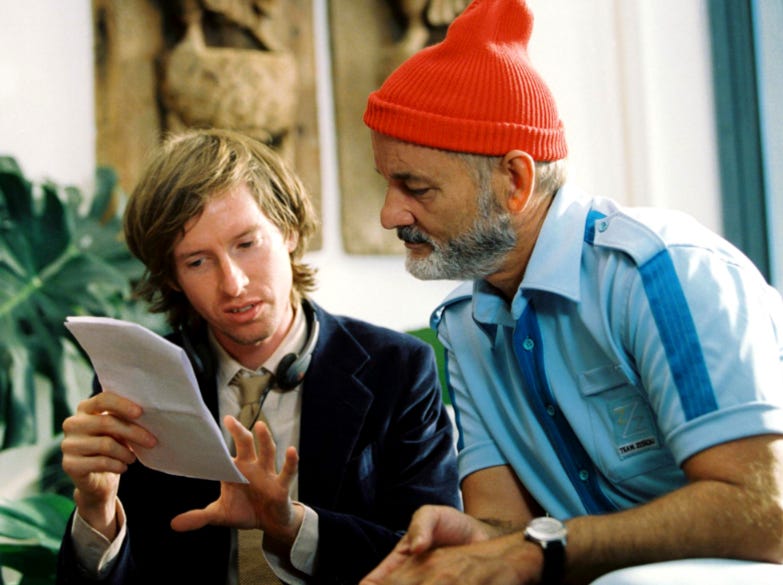Wes Anderson II
Part II of an appreciation of the director's style
With the opening of The Phoenician Scheme, this essay, in several parts, sheds some light on his films and his process. This is the second part of three. Here is the link to the First. The essay was initially intended for a book of interviews. Thanks to Gerald Peary, Boston critic, editor, filmmaker, and friend, whose advice is always helpful and instructive.
II
One of Anderson’s skills is casting the right actor, then directing with precision. Having intuited that a given actor has the intelligence and physicality for a particular role, he encourages playfulness while being specific about the rhythm and pace of the dialogue. That instinct for the right player led to Owen Wilson’s and Jason Schwartzman’s first roles. Blending professionals with amateurs brings sincerity to the comedy. Young Jared Gilman and Kara Hayward as Sam and Suzy in Moonrise Kingdom are examples. They play their parts with utmost seriousness.
A key to directing a non-actor is to make the performance as natural as possible by under-defining the character. Physicality, costuming, and dialogue do most of the work, with the audience filling in a personality based on those particulars. With skilled actors, he encourages lively imagination and invention. Tilda Swinton may be the best example. Her skill in creating characters precedes her involvement with Anderson, and she has done great comic work in Grand Budapest, Moonrise Kingdom, and The French Dispatch.
Bill Murray takes the opposite approach. His comic mode is low definition, appearing both insecure and arrogant at once. It is a cool approach that allows the audience to empathize with him because he never gives too much of himself. It also allows other actors to bounce their antics off his calm surface. It is a character evolved from both television and a number of films. His persona as a goof in films like Caddyshack could wear thin. As a skilled and genial non-conformist, his position as an Anderson alter ego perfectly fits. Anderson and Murray keep their personal lives private without needing aggrandizement. Murray is a genius of comic timing, and his personality and skill make him a paterfamilias to the Anderson film family.
Directing The Phoenician Scheme
The most common criticism of Anderson is that each film is a rehash of style, a critique that does not appear to affect his work. The eleven films have grown in elegance and sophistication within a high individual style. They exist outside of politics and apart from any specific period, but the glossy surfaces belie darker themes: thievery (Bottle Rocket), adolescent arrogance (Rushmore), the trappings of celebrity (Life Aquatic), enlightenment tourism (Darjeeling). In Mr Fox, he turns a favorite childhood memory, as noted by Ian Nathan, into a kind of Preston Sturges’ comedy voiced by George Clooney, Meryl Streep, Leonardo DiCaprio, and Brad Pitt, actors at ease with breezy comedy. Still, the primal fear of survival and family dysfunction looms. Moonrise Kingdom is possibly the most surreal of the films, but it feels quintessentially American with Boy Scout Troops, a small-town sheriff, an amateur theater production, and another troubled family all in a kind of Never Never Land.
Murray and Anderson during The Life Aquatic
The attraction for Anderson aficionados comes from the anticipation of his familiar style. The expectation is their charm. Each film is a fresh flight of imagination with stories within stories, frames filled with details, sly references to film and literature, full of inter-titles, and narrative asides. The films' meticulous look contrasts with the cast's loose ambiance. Each group is an eccentric new family. Smart, breezy scripts often written with friends Owen Wilson, Roman Coppola, and Jason Schwartzman provide a satisfying consistency of dry humor, complemented by Mark Mothersbaugh's whimsical scores or framed by Alexander Desplat’s elegant orchestrations. The earliest films, in particular, have a crazy quilt of pop songs from various eras and genres.
Cloaking these themes in comic tropes is part of Anderson’s trickery. Insights are delivered with a smirk. Characters are representative types whose braggadocio, struggles, and insecurities are familiar. Dreams and insecurities are far from naturalistic, but with recognizable flaws and failings. There is little fretting over conflicts or shedding of tears over tragedies.
Characters are variously statements on social identity (Dignan in Bottle Rocket), family dysfunction (Royal Tenenbaums), the delusions of ambition (Max Fischer in Rushmore), the slippery slope of celebrity (Steve Zissou), pride and parenthood (Mr Fox) enlightenment tourism (Peter and Jack in Darjeeling Limited ) community and conformity (Moonrise Kingdom), the travails and dissolution of history (Grand Budapest Hotel), global greed and corruption (Isle of Dogs). In addition, there is a flow of cultural references with a wealth of nods to cinema history. Wes Anderson films become puzzles. They visually dazzle us, the characters amuse us, and audiences are left to put the pieces together into a thematic whole. Like Chaplin or Keaton, the precise mechanics of comedy in masterpieces like City Lights or The General are also social statements.
To Be Continued . . .
Shooting miniatures for The Fantastic Mr Fox
.





